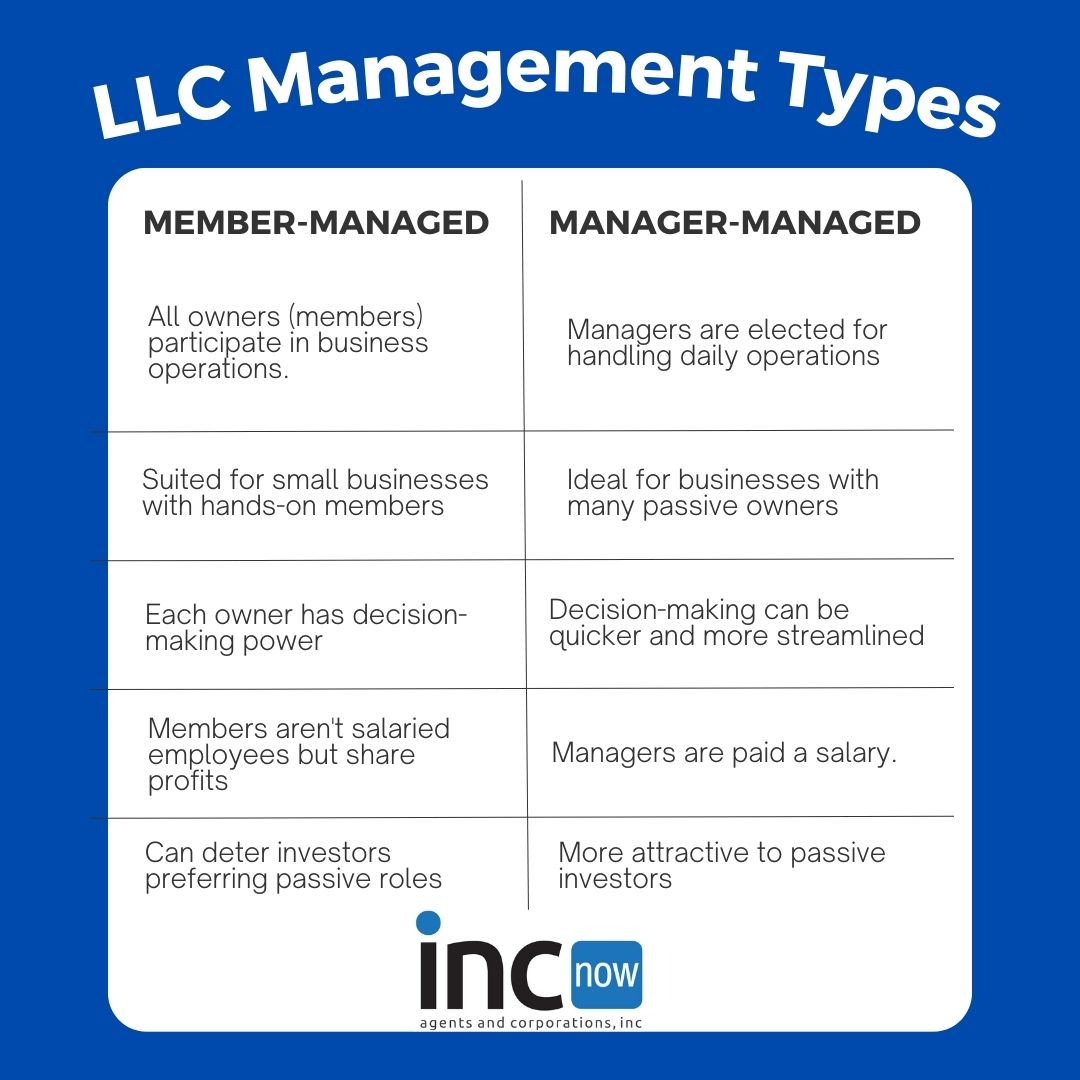How to Structure an LLC: Member-Managed vs. Manager-Managed

But did you know that even within LLCs, there are different management structures to consider? In this article, we dive deep into two main types of LLCs: member-managed LLCs and manager-managed LLCs. By the end of this article, you’ll have a better understanding of how to structure an LLC and which option is best for your business.
What Is a Member-Managed LLC?
In a member-managed LLC, all the owners of the company, called “members”, are involved in making business decisions. It’s a bit like being on a team where everyone gets to have a say in the game plan.
In a member-managed LLC, each member can:
- Sign contracts for the company;
- Hire employees; and,
- Make decisions about the company’s direction.
What Businesses Are Member-Managed LLCs?
If you’re a small business owner who wants to stay hands-on and be involved in the day-to-day operations of your company, this could be the right choice for you.
A common example of member-managed LLCs are single-member LLCs, which are owned and operated by just one person. In a single-member LLC, the sole member is also typically the manager of the company.
Keep in mind, though, that a member-managed LLC requires more effort from each owner. Running a member-managed LLC is a bit like being a player-coach in a sports team – you’re not just on the field, but also making strategic decisions.
One thing to consider with a member-managed LLC is whether you are looking to attract investors. Oftentimes, outside investors want to be “passive” investors in the business and prefer not to get involved in daily operations.
What Is a Manager-Managed LLC?
Now, let’s talk about manager-managed LLCs. In a manager-managed LLC, the members elect a manager, or managers, to handle the day-to-day operations. The manager can be a member, but they don’t have to be. A manager-managed LLC is similar to a traditional corporation where the board of directors makes decisions that are carried out by executives.
What Businesses Are Manager-Managed LLCs?
If your business has many owners, or if some of the members prefer to be passive investors, a manager-managed LLC could be a good choice. The elected manager can make decisions quickly, without waiting for approval from all the members. However, while it can be efficient, this structure might mean that not all owners get a say in every decision.
Member-Managed LLC vs. Manager-Managed LLC: Pros and Cons
Member-managed LLCs and manager-managed LLC both have some pros and cons. Let’s take a look at some of them.
In a member-managed LLC, all members have a say in decisions. This can be great for small businesses where everyone wants to be involved. Member-managed LLCs are generally less complicated and can be easier for some businesses to manage. However, management responsibilities can be time-consuming for the members and might deter investors who prefer not to deal with a business’s daily operations.
A manager-managed LLC can allow for quicker decisions and is ideal for businesses with many owners or passive investors. Appointing a third-party manager that is responsible for daily business operations can help avoid a situation where too many cooks spoil the broth, so to speak.
The downside in a manager-managed LLC is that not all owners get to participate in daily decision-making. Plus, if you hire a professional manager, you’ll need to pay them a salary, which could be a challenge for smaller businesses.
How To Choose: Member-Managed LLC vs. Manager-Managed LLC
How do you decide whether a member-managed LLC or manager-managed LLC is right for your business? Well, it really depends on your situation.
If your business has many members or investors who prefer a more passive role, a manager-managed LLC might be the better choice. This structure can streamline decision-making and help the business operate more smoothly.
For example, imagine an e-commerce company where two founders have attracted a couple of investors. These investors aren’t interested in managing the daily operations; they only want to invest their money. In this case, the company might choose to be a manager-managed LLC, allowing the founders to run the business while the investors stay in the background.
On the other hand, if you have a small business with only a few members, and you all want to be involved in the daily decision-making process, a member-managed LLC might be a better fit. Consider a family-owned restaurant where each family member has a specific role and wants a say in how the business is run. In this case, a member-managed LLC would allow each member to be actively involved in running the business.
Remember, the main idea is to choose a structure that best suits your business needs and preferences.
How To Pay LLC Members and Managers
The roles and compensation within an LLC can depend on the management structure. In a member-managed LLC, the members are owners and share the profits of the business. LLC members are not considered employees, and therefore, do not receive a salary. Instead, they get paid through distributions made from the company’s profits.
In a manager-managed LLC, the managers might be professional managers who are not owners in the LLC. Professional managers are considered employees and receive a salary for their work. This means that if you hire a professional manager, you’ll need to account for their salary in your budget.
INCNOW: HOW TO MANAGE LLC CAPITAL CONTRIBUTIONS AND DISTRIBUTIONS
Flexibility is Key
The good news is, LLCs are flexible. If you start with one management structure and find that it’s not working for you, you can change it later. For instance, a business might start as a member-managed LLC but then decide to switch to a manager-managed structure as it grows and attracts investors. All it takes is some updates to the company’s LLC Operating Agreement and the consent of the members.
However, any changes to an LLC’s management structure should be done carefully and, ideally, with the help of a professional. For example, IncNow can help prepare an Amended and Restated Operating Agreement for a Delaware LLC. It’s crucial to make sure that everyone understands their roles and responsibilities, and the implications of any changes.
Choosing a management structure for your LLC is an important decision. It affects how your business will operate and how decisions will be made. Both member-managed and manager-managed LLCs have their advantages, and the best choice depends on your business’s unique needs and circumstances.
If you’re a hands-on owner who wants to be involved in daily operations, consider a member-managed LLC. If you prefer to delegate daily operations to a professional manager or if you have many owners or investors, a manager-managed LLC might be a better choice.
Remember, there’s no one-size-fits-all answer, and it’s okay to change your mind later as your business grows and evolves.





